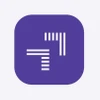Operational CRM tools help companies to automate mundane marketing, sales, and customer service tasks. Starting from creating and analyzing marketing campaigns, to nurturing leads and customers and responding to customer queries, CRM in operations management can be quite useful.
Here, in this article, we will learn everything about operational CRM software, its benefits, types and some of the best examples for your business.
Providing excellent customer service is an important aspect of business operations. Customer relationship management software (CRM) helps businesses to streamline all the operations related to sales and marketing and improve the customer experience.
There are different types of CRM including analytical, operational and collaborative customer relationship management software. Out of these, the operational CRM is most useful for handling all the tasks related to marketing, sales, and customer support.
What is Operational CRM?
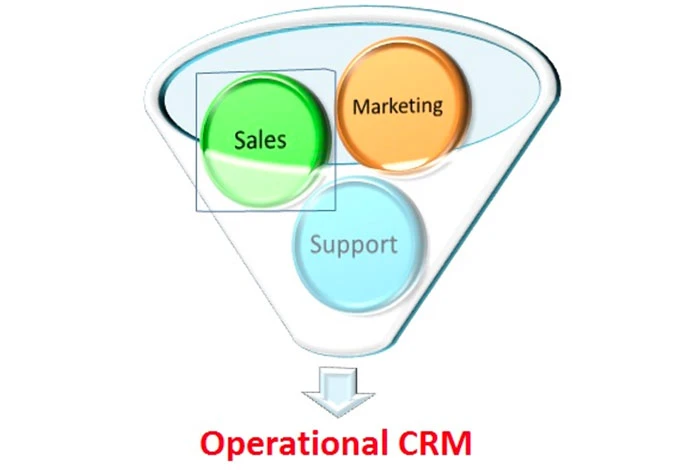
An operational CRM tool automates the tasks related to marketing, sales, and customer support. It automates mundane tasks like creating and sending follow up mails, analyzing customers data, generating and converting leads, tracking sales projections, etc.
The software stores & maintain all customer data in a centralized database which is used to improve customer relation, boost sales, & enhance marketing campaigns. The key functionality of CRM in operations management is to enhance customer acquisition and retention processes.
How Does Operational CRM Tool Work?
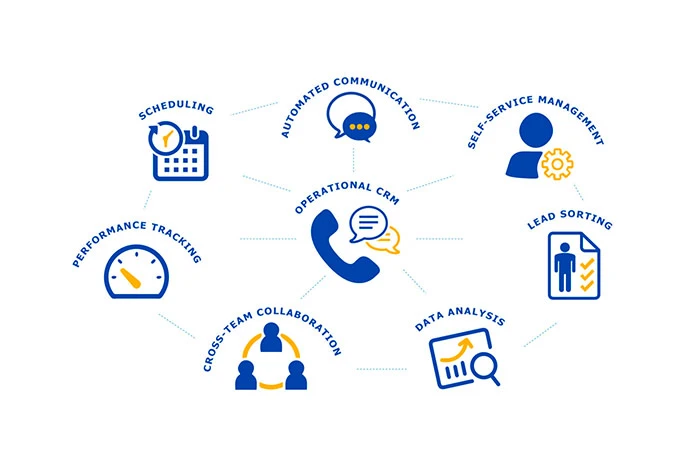
Operational CRM software supports automation and data management functionalities to improve all the aspects of customer relation strategies. It simplifies and manages all key tasks related to marketing, sales, and support throughout the customer’s entire lifecycle and works in the following ways:
- Sales Operations: The sales team gets help in managing leads, identifying prospects, tracking customer interaction, and more.
- Marketing Operations: Marketing team uses this software to analyze the customer’s data and create effective marketing campaigns to target the audience.
- Customers Service Operations: It accelerates the work of customer support teams by helping them to automatically reply to the customer’s queries, managing service requests. It also assigns the requests raised to the concerned authority for faster query resolution.
Suggested Read: Best Sales CRM Software
Benefits of Operational CRM Software
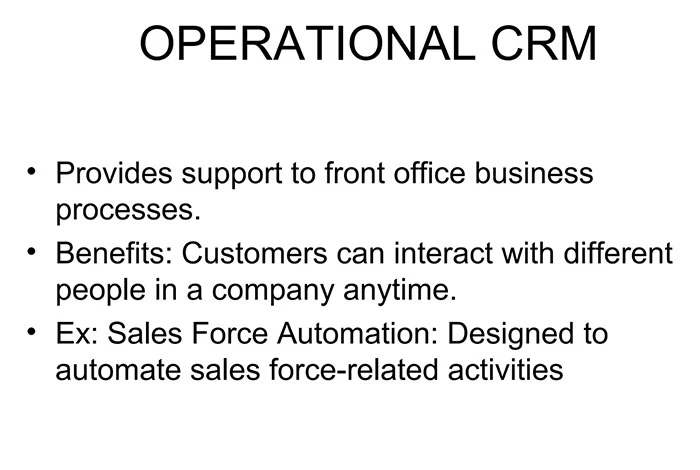
Operational CRM software is ideal for improving customer experience and loyalty. In addition to that, other benefits are for business, includes better internal communication, optimized upselling and cross-selling, automated repetitive tasks, etc.
- Maximize Upselling and Cross-Selling: Sales representatives have all the customers data including its purchase history, interests, budget, etc. At their fingertips. All this data is analyzed and used to find upselling and cross-selling opportunities for existing customers.
- Improve Customer Satisfaction: With CRM in operations management, you can quickly respond to customers’ queries, help them with the purchase, send automated responses, etc. All these factors help them to improve customer satisfaction.
- Increase internal communication: Record, store, and disperse data among different departments of the organization, thus improving inter-departmental communication. Further, it also eliminates the chance of data misrepresentation.
- Improve Marketing Processes: The customers’ data gathered through operational CRM software analyze the purchase behavior, demographics, budget, etc. The data is then used to create marketing campaigns tailored for different customer groups to boost sales.
- Automated Repetitive Tasks: The solution helps in saving time and energy by automating tasks like sending follow-up mails, lead scoring and routing, updating customer information, etc. This helps you to deliver a better experience to your customers.
Suggested Read: Types of CRM Software: How Should You Choose One for Your Business | What Is Analytical CRM: A Complete Guide to Its Types, Benefits & Features
How Is Operational CRM Different?
Operational CRM is different from other CRM solutions in multiple ways, such as-
- Focus: It is focused more on improving the sales, marketing, and support procedures to improve customers’ relationships.
- Cycle: It is used to manage the entire lifecycle of customers from the prospective leads till they become customers.
- Teams: Operational CRM tools are used by teams that are directly in contact with customers including sales, marketing, and support.
- Automation: It helps automate key tasks related to sales, marketing, and customer support teams. Some tasks that can be automated include sending follow-up emails, identifying prospective customers, responding to customer queries, etc.
- Issues Addressed: It helps in addressing customer issues, automating sales processes, improving marketing campaigns, etc.
Best Operational CRM Examples
There are multiple types of CRM software that comes with a combination of operational, analytical, and collaborative features. However, some of them have specific functionalities pertaining to operational management. Some of the best software include-
- HubSpot
HubSpot is a customer relationship management solution helping organizations to manage their contacts, sales, digital marketing, lead nurture, pipeline, etc. Some key functionalities include real-time sales tracking, pipeline management, live chatting, document sharing, sales quotes generating, etc.
- PipeDrive
PipeDrive is an operational CRM software specially designed for sales teams to manage leads, visualize sales pipelines, track customer’s interaction, and more. Further, this tool will also show the conversion rate in real time to help you create effective strategies to improve the conversion rate. Moreover, you can also automate 100+ workflows with PipeDrive.
- Salesforce
It is operational CRM software that helps businesses with sales operations and customer support collaboration. Salesforce comes with multiple features like lead management, workflow automation, collaborative forecasting, sales forecast, etc. These features help sales teams to nurture leads and convert them into prospective customers.
- Nimble
Nimble is a social sales and marketing operational CRM software to simplify the operations of sales and marketing teams. It features relationship management, data enrichment, pipeline management, and customer support functionalities. These modules help businesses organize and maintain contacts, send trackable emails to the targeted audience, manage sales pipeline, etc.
- Zoho
Zoho is an all-in-one CRM software to help businesses manage their sales, marketing, and customer support operations. It comes with multiple features like lead management, sales process builder, omnichannel communication, sales forecasting, customer segmentation, and team collaboration. Zoho CRM acts as a centralized database to keep all the sales, marketing, and customer support activities together.
Suggested Read: How to Scale Up Business With CRM System? | How to Enhance Sales Productivity with Sales CRM Software
Types of Operational CRM Software
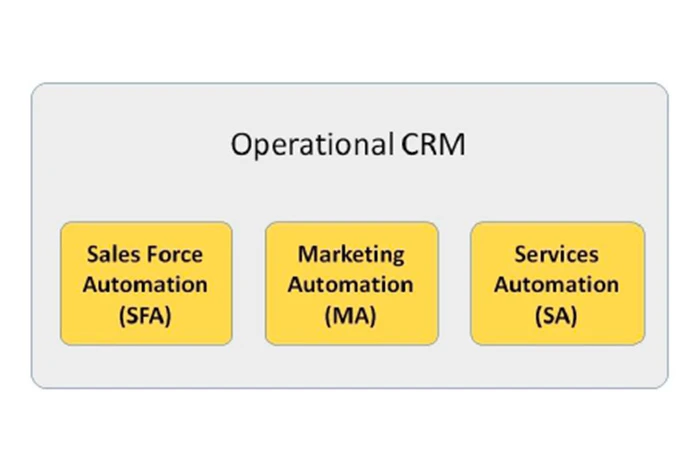
There are three different types of Operational CRM Software including marketing automation, sales force automation, and service automation.
- Marketing Automation: This type of operational CRM helps businesses find the best strategies to promote the products and reach out to potential customers with campaign management modules. Further, it helps them to find the most effective channel to reach potential customers including emails, SMS, social media sites, etc.
- Sales-Force Automation: The sales force automation module helps organizations identify potential prospects, track customer interactions, manage documentation, create sales projection, etc. It also records all the communication with prospects and helps sales reps with lead conversion.
- Service Automation: It is developed to help to provide the highest customer experience to its customers by quickly responding to their queries and questions. Customer service representatives can use the service history to deliver faster responses to customer questions, service requests, or queries. Moreover, the requests raised by customers can also be assigned to the person concerned for faster service.
Related Categories: Contact Management Software | Loyalty Management Software | Lead Management Software | Real Estate CRM Software
FAQs
What is the difference between operational and analytical CRM?
Operational CRM is used by businesses for lead generation and converting them into prospective customers. It also provides the service infrastructure required to retain customers. Whereas Analytical CRM is used to gather and analyze all the data of customers and their communication with the organization.
What are the examples of operational CRM?
Some popular examples of operational CRM include HubSpot, PipeDrive, Salesforce, Agile, Zoho, Streak, Nimble, Insightly.
What do the operational components of a CRM accomplish?
The operational components of a CRM include people management, sales automation, lead management, etc. These help businesses improve their interaction with customers and identify their product references. It can also be used to automate customer responses for better customer experience.
What is a part of operational CRM that automates service requests?
Customer service and support is used for automating complaints, services requests, product returns, information requests, and any other things related to customer queries.
5.What is included in sales operational CRM technologies?
Operational CRM focuses on simplifying customer interactions across sales, marketing, and customer service processes. It comes with several tools for enhancing customer acquisition and retention. Further, you can also use it to store customer data in a centralized repository and analyse it for better service.
Varsha is an experienced content writer at Techjockey. She has been writing since 2021 and has covered several industries in her writing like fashion, technology, automobile, interior design, etc. Over the span of 1 year, she has written 100+ blogs focusing on security, finance, accounts, inventory, human resources,... Read more









